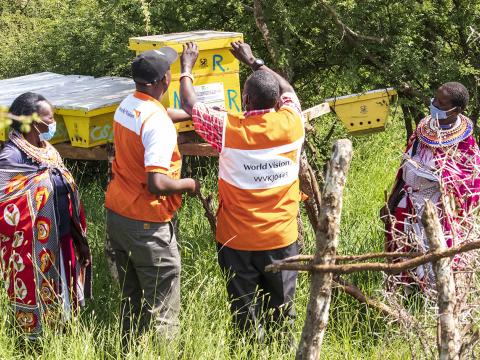Sweet Alternative: Honey Cushions Families from COVID-19 Economic Hurdles

By Wesley Koskei, World Vision Communications Officer, Kenya
Margarete, a mother of five, is passionate about beekeeping.
As the caretaker of 20 beehives belonging to the Nashipa Ramat Women’s Group that she is part of, Margarete always ensures that the bees are well catered for so as to increase their productivity.
Consequently, she always feels at home - with soldier bees buzzing around her - as she makes regular ‘check-up’ visits at their apiary in Laikipia County, Kenya.
Her group is among the many beneficiaries of beehives and other beekeeping products that World Vision has distributed to community groups at Laikipia, Isiolo, Marsabit and Samburu Counties in Kenya.

This initiative is supported by the organisation’s Integrated Management of Natural Resources for Resilience in Arid and Semi-Arid Lands (IMARA) programme, which is funded by the Swedish International Development Co-operation Agency (SIDA) in Kenya.
“Just last week, we harvested 46 kilogrammes of honey from beehives that we received from World Vision, early in the year. This is a big deal as the honey will give us cash to support our families,” says Margarete.

She notes that the harvest has come at the right time. “We used to rely on selling livestock and beaded ornaments. But due to COVID-19, livestock markets have been closed and there are no tourists to buy our ornaments. So, we are now relying on honey to give us income,” Margarete says.
In the past, the largely pastoralist community in Laikipia County used to view honey as food for home consumption solely.

As such, people did not consider it as a product that could be used to generate income.
However, their mind-sets began to change after World Vision trained them on effective beekeeping strategies and supported community groups like Margarete’s to transform the activity into a business venture.
The organisation also promoted the use of appropriate technologies that increase honey production.

These initiatives seek to improve the livelihoods of more than 19,000 households through beekeeping enterprises in dry areas like Laikipia.
“Now we have an alternative source of income to support our households. We’ll sell the harvested honey to our Naitumtum Lotoro Beekeepers Co-operative society so as to get money. The cash will help us to take good care of our children and family,” says Margarete.

Co-operative societies play a key role in sustaining beekeeping enterprises as they provide a ready market for honey harvested by their members.
The aggregated honey is then sold to clients in external markets at lucrative prices that boost the share value of members, enabling them to get additional income through yearly dividends.
In addition, co-operative societies enable members to borrow and repay loans that they can use to grow their businesses or meet critical household expenses whenever they are starved for cash.
“This is why we why we want co-operative societies in this area to thrive. We are building the capacity of these organisations to ensure that they are effectively managed. We are empowering them to produce and sell high quality honey that is certified. We also help them to identify key markets for the products,” says Fidel Wambiya, the Market Systems Advisor for World Vision’s IMARA programme in Kenya.
Tom, a member of the Omom group that also received beehives from World Vision, notes that the area’s co-operative society has played a significant role in the success of their enterprise.
“They buy honey from us and sell them to clients. We’ve already sold around 1.5 tonnes of the product. This is a difficult time, so the money we get from selling the honey - no matter how little it may be – enables us to support our children and families, ” he says.

Honey and Beekeeping ventures are emerging as natural resource enterprises that enable communities in arid areas to diversify their livelihoods or income sources.
Such business ventures allow communities to conserve the environment as they see the direct benefits of doing so.
For instance, beekeeping provides an incentive for farmers to conserve or plant more trees so as to boost the productivity of the bees.
“We look at the beekeeping value chain in its entirety, from production to the market so as to ensure that communities can sell a unique product with a competitive edge in premium markets,” Wambiya says.